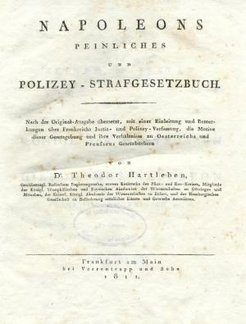The development of criminal justice in transition from the ius commune to the criminal law of the nation-state
Research Project

The project investigates the changes of criminal justice – as system of norms, institutions, procedures, punishment, and criminal policy – in Europe from the mid-18th century to the 19th century. Along with developments such as the codification of criminal law, the differentiation of criminal law science and the changes concerning judiciary, punishment, criminal policy and police law, under scrutiny are also practices of extra-judicial and infra-judicial of conflict regulation such as mediation and pardon as well as the representation of crime and justice in popular media. Research is carried out in cooperation with the Kunsthistorisches Institut/Max-Planck-Institut Florenz, the University of Valencia (Faculty of Law) and the DFG Collaborative Research Centre/Transregio 138 "Dynamics of Security. Types of Securitization from a Historical Perspective" (Marburg/Gießen). Recent case studies investigate the relation between police law, political police and the codification of criminal law, the transnational influence of the French Code pénal of 1810; the dissemination of criminal codes and their alternatives through popular media in the age of enlightenment and revolution and the importance of ‚social defence‘ and transnational criminal law for the network of positivist criminology (1871-1918).
